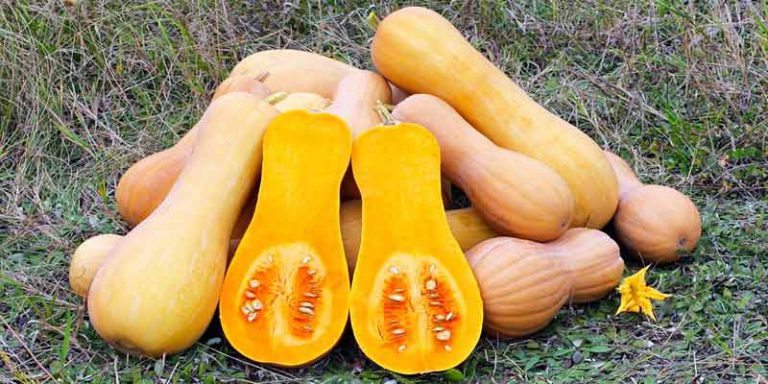Butternut squash is a winter squash, which means it’s a seasonal vegetable. It’s grown and harvested during the winter months from October to February. Due to being a seasonal vegetable, most people will try to find a way to keep them fresh for later usage. You can store them in the pantry, fridge, or freezer. Can butternut squash go bad if stored in one of these places?
Can butternut squash go bad? Yes, just like any other vegetables, butternut squash can go bad. They are quite hardy vegetables and can last for a long time if it’s stored properly. Over time, they will start to go bad and will show signs of spoilage. Since these vegetables tend to go bad slowly, you’ll have plenty of time to save them.
How Long Does Butternut Squash Last?
Whole butternut squash will last up to 3 months in ideal conditions. This means the temperature where it’s stored should be is 50°F to 55°F (or 10°C to 13°C). Unfortunately, for most people, that temperature range is difficult to maintain constantly.
Therefore, the best place to keep butternut squash is in the pantry. This is where it’s generally cooler than the rest of the house. By storing in the pantry, the squash can last for a month or two.
Of course, the time when it was harvested and when you bought it will greatly affect the actual shelf life of the squash.
At room temperature, once the butternut squash is cut and the flesh is exposed, it will last for about 3-4 hours. If you’re not planning to use it after 4 hours, make sure to store them in the fridge.
For cut or chopped butternut squash, it can last 3 to 4 days in the fridge. Make sure to store them in an airtight container or it will shorten their shelf life dramatically.
Once the butternut is cooked or baked, it should last 4 to 5 days in the fridge.
How To Tell When Butternut Squash Go Bad
When butternut squash goes bad, it will show signs. The good thing about the squash is they will go bad slowly. This means it will give you time to save them or cook them before it has to be thrown away.
Below are some of the signs to look for when butternut squash goes bad:
The first thing to check is the appearance of it. Butternut squash that’s of good quality will be firm, fairly even color, and don’t have any soft or mushy spots.
If there are certain parts of the squash that’s mushy or damaged, you can simply cut the bad part out and use the rest. However, if the whole squash is soft and liquids are starting to leak out of it, it’s best to throw it out.
If the rind of the butternut squash seems fine, the next thing to check is the inside of it. The flesh should have a nice color and texture to it.
If the inside has any small area that is mushy or soft, you can cut them out and use the rest. However, if there are large areas of the flesh that’s mushy, you should discard the whole squash.
As for cut butternut squash, if it’s been in the refrigerator for longer than a week, you should discard it. Even if the rind and flesh seem okay, the texture and flavor have greatly deteriorated.
For cooked butternut squash, whether it’s stored at room temperature or in the fridge, look for any signs of mold and a rotting smell.
Sometimes, the cooked squash can be left at room temperature for too long where it will be contaminated. When the cooked squash is stored in the fridge, mold will start growing on it after a day or so. If that’s the case, you should throw out the entire cooked butternut squash.
How To Store Butternut Squash?
At room temperature, butternut squash should be stored in a cool and dry place. A good place for them is the pantry.
For cut or chopped up butternut squash, they should not be stored at room temperature for longer than an hour. Leaving them out to exposed to the air could cause them to become contaminated.
As for cooked butternut squash, they should not be left at room temperature for longer than 30 minutes. If it’s going to be longer than that, store them in the refrigerator. Like cut squash, they could become contaminated.
As for the refrigerator, never store whole butternut squash in there. Doing so will cause the texture to be damaged. If it’s been sitting in the fridge for a couple of days, due to the cool temperature, it will make the squash mushy.
Instead, cut or chop butternut squash should be stored in the fridge. Place them into an airtight container or resealable plastic bag. If you’re using a plastic bag, make sure to press on the bag to remove as much air as possible before sealing it. Exposure to air will cause it to become oxidated and cause the squash to go bad prematurely.
If you’ve cooked butternut squash, they too should always be stored in the fridge. Let them cool to room temperature before storing them in an airtight container. If you don’t let the squash cool first, the moisture will evaporate and cause condensation in the container.
Can You Freeze Butternut Squash?
Butternut squash is only available during the fall and early winter. This means if you enjoy eating it while it not in season, freezing the squash is an excellent option. With butternut squash, due to their texture, it’s best to cook them first before freezing it. You can either freeze them byThe same goes if you know that you won’t be able to finish the squash before it goes bad.
With butternut squash, due to their texture, it’s best to cook them first before freezing it. You can either freeze them by themselves or part of your favorite cooked squash recipe.
However, you can freeze raw butternut squash as well. Make sure it’s cut or sliced first before freezing them. Whole squash will freeze well, but when it comes time to thaw it, the squash will become mushy.
Before freezing raw squash, it’s a good idea to blanch them first. Blanching the butternut squash will help preserve the texture and flavor when it’s frozen.
After blanching the squash, always use the flash freezing method. This will help prevent the vegetables from sticking to each other while it’s frozen.
When it comes time to freeze it, proper storage is the key to keep them fresh for a long time. Once the cooked butternut squash has cooled to room temperature, place them in an airtight container. If you plan on eating the squash often, it’s a good idea to freeze them in portion. That way, you can thaw as much as you need for a single meal.
Butternut Squash Storage Container
Airtight Container

If you’re going to store the butternut squash in the fridge, the most airtight container will work perfectly fine at keeping them fresh.
However, if you’re going to store the squash in the freezer, just any ordinary airtight container will not work. The freezing temperature will most likely cause air to leak in and destroy the winter squash.
Therefore, you’ll need to get an airtight tight container that’s designed for freezer usage.
Plastic Bag

If you’re planning to store butternut squash in the freezer, an ordinary plastic bag will not work. Due to the extremely cold temperature, you’ll need to use ones that designed to work in a cold environment.
For plastic bags, you should buy those that are freezer bags.
Related Questions
Can you freeze butternut squash soup?
Yes, you can freeze butternut squash soup. Most food that is soup based will freeze easily due to the high water content that it has. Once the butternut squash soup is cooled to room temperature, place them into an airtight container and place it in the freezer. Be sure to use it within 3 months for the best taste.
Can you freeze butternut squash puree?
Yes, butternut squash puree can be frozen. Due to the liquid texture, the puree will freeze well in the freezer. When storing them in an airtight container, make sure to leave about an inch at the top to allow room for expansion. If not, as the butternut puree freeze, it will expand and crack the container.
Can you freeze butternut squash fries?
Yes, you can freeze butternut squash fries. In order to keep them from clumping together during freezing, you’ll need to flash freeze them first. Once you’ve cut the butternut squash, place each fries onto a clean baking or wax paper. You can place a tray underneath the wax paper for easier handling. Place the tray of fries in the freezer for about 1-2 hours. Once it’s completely frozen, take it out from the freezer and immediately transfer it to an airtight container or freezer bag. Seal the bag or container tight, label it with the freezing date, and place it back into the freezer.


